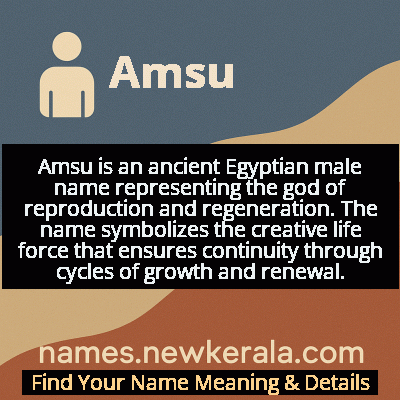Amsu Name Meaning & Details
Origin, Popularity, Numerology Analysis & Name Meaning of Amsu
Discover the origin, meaning, and cultural significance of the name AMSU. Delve into its historical roots and explore the lasting impact it has had on communities and traditions.
Name
Amsu
Gender
Male
Origin
Egyptian
Lucky Number
9
Meaning of the Name - Amsu
Amsu is an ancient Egyptian male name representing the god of reproduction and regeneration. The name symbolizes the creative life force that ensures continuity through cycles of growth and renewal.
Amsu - Complete Numerology Analysis
Your Numerology Number
Based on Pythagorean Numerology System
Ruling Planet
Mars
Positive Nature
Generous, passionate, energetic, and humanitarian.
Negative Traits
Impulsive, impatient, moody, and can be overly emotional.
Lucky Colours
Red, maroon, scarlet.
Lucky Days
Tuesday.
Lucky Stones
Red coral, garnet.
Harmony Numbers
1, 2, 3, 6.
Best Suited Professions
Military, sports, philanthropy, leadership roles.
What People Like About You
Courage, energy, leadership, generosity.
Famous People Named Amsu
Amsu Min
Ancient Egyptian Priest
High priest of the fertility cult at Akhmim, known for elaborate rituals celebrating agricultural cycles
Amsu-Nakht
Royal Scribe
Documented temple rituals and agricultural practices, preserving knowledge of ancient Egyptian reproduction ceremonies
Amsu-Ptah
Temple Architect
Designed fertility temples incorporating mathematical principles of growth and regeneration
Name Variations & International Equivalents
Click on blue names to explore their detailed meanings. Gray names with will be available soon.
Cultural & Historical Significance
Extended Personality Analysis
Those named Amsu are typically characterized by their generative nature and capacity for nurturing growth in all aspects of life. They possess an innate understanding of cycles and timing, often excelling in fields requiring patience and long-term vision. Their personality blends creative intuition with practical wisdom, allowing them to transform ideas into tangible results. These individuals are often seen as pillars of their communities—reliable, fertile sources of support who help others flourish. They tend to be deeply connected to natural rhythms and processes, whether in gardening, business development, or personal relationships. Their strength lies in resilience and regeneration; when faced with setbacks, they demonstrate remarkable ability to start anew, often emerging stronger than before. While sometimes perceived as traditional or cyclical in their thinking, this actually reflects their profound understanding that all meaningful creation follows natural patterns of growth, decay, and renewal. They make excellent mentors, parents, and leaders because they instinctively know how to cultivate potential in others.
Modern Usage & Popularity
In modern contexts, Amsu is primarily used as a distinctive given name that connects contemporary individuals to ancient Egyptian heritage and values. While uncommon in global naming trends, it maintains a niche popularity among Egyptian families preserving cultural traditions, historians, and those interested in mythological names with positive connotations of life and growth. The name has gained some traction in recent years among parents seeking unique alternatives to more common mythological names, particularly in academic and artistic communities. Its usage reflects a growing appreciation for names that carry deep symbolic meaning related to sustainability, creativity, and natural cycles. Though statistical data is limited due to its rarity, anecdotal evidence suggests Amsu appears more frequently in regions with strong Egyptological interests and among families valuing names that represent enduring life principles rather than fleeting trends.
Symbolic & Spiritual Meanings
Symbolically, Amsu represents the eternal principle of regeneration that underpins all existence—the understanding that endings are illusions and transformation is constant. The name embodies the creative masculine energy that initiates new life, whether biological, intellectual, or spiritual. It symbolizes the fertile void from which all possibilities emerge and the disciplined power that shapes potential into reality. Metaphorically, Amsu represents the gardener who tends the seeds of future harvests, the teacher who plants knowledge in young minds, and the innovator who transforms raw materials into useful creations. The symbolism extends to concepts of legacy and immortality through progeny, ideas, or works that continue influencing the world long after their originator has passed. In psychological terms, Amsu symbolizes the human capacity for self-renewal—the ability to heal from trauma, learn from failure, and continually reinvent oneself while maintaining core identity and values.

